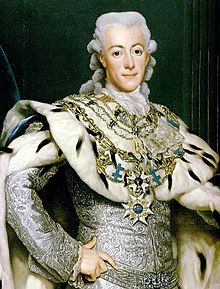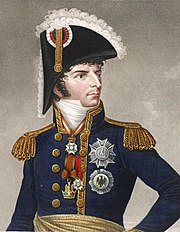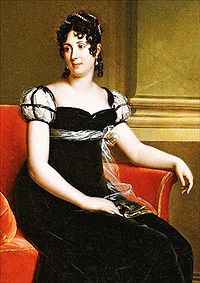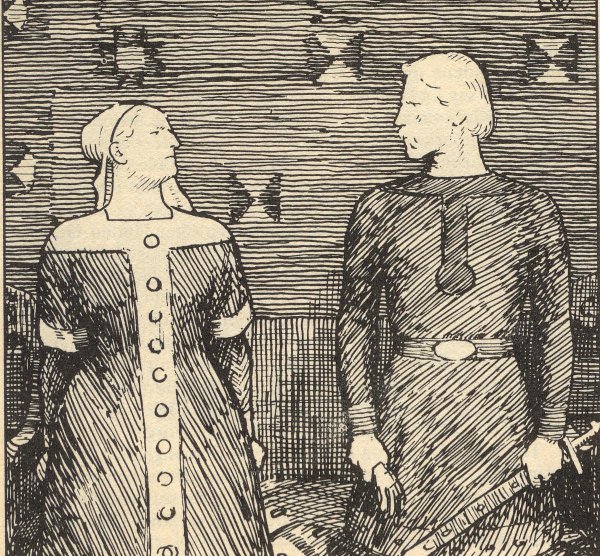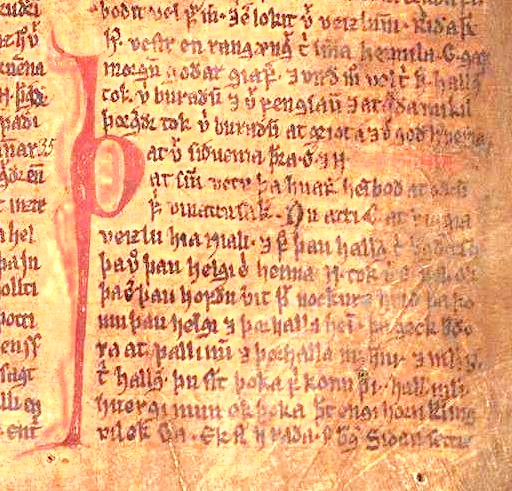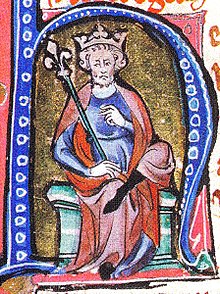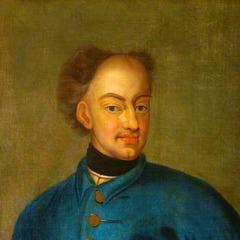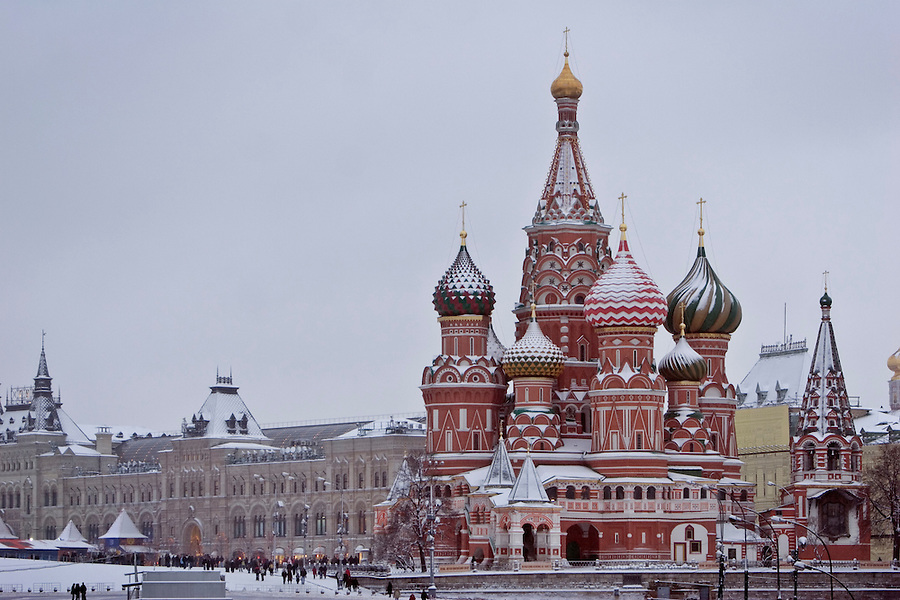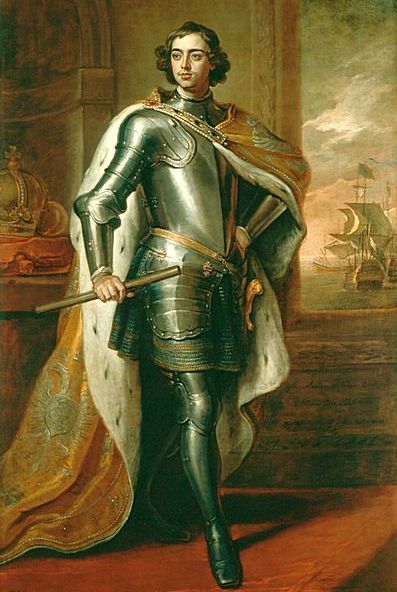One of the most colorful queens of history, Christina of Sweden lived many lives within the span of 62 years. An enigma wrapped in a mystery deep-fried in a contradiction, she ruled Sweden for fourteen years and oversaw some of the best infrastructural and cultural improvements of the country at the time, yet she abandoned her country to live unfettered by duty. She was a philosopher and a patron of the arts whose collecting and patronage preserved some of the best late Renaissance/early Baroque art and music, and was a major player on the European political stage.
Christina was born in December of 1626 to Queen Maria Eleonora of Brandenburg and Gustav II Adolf, who were desperately seeking an heir. Maria had had three previous miscarriages, and all of them had been girls. When Christina was born, Maria was very disappointed that she had another daughter instead of the son she had hoped for. Gustav, on the other hand, was ecstatic that they finally had a living child and ordered that she be treated and educated as a prince. Four years later, she was declared heir apparent.
Gustav was deeply embroiled in the Thirty Years War, and after being separated from his men, he died in battle in 1632. Gustav was a remarkable ruler in his own right, but his wife was...unstable. Before his death, Gustav had ordered that Christina be raised by her aunt Catherine and not by her mother. However, that order was disobeyed, and Christina lived with her mother for several years.
To say that those years were unhappy would be an understatement. Maria Eleonora had plunged into a deep depression after the death of her husband. She had her apartments draped in black and refused to let Gustav be buried keeping his body lying in state, except for his heart, which she kept with her in a small, gold casket. She insisted that Christina be with her at all times and, in turns, verbally abused her daughter for not being a boy, criticized her for not being feminine enough, and scarred the young queen with outbursts of violent affection. The governors appointed by Gustav to take care of Christina during her minority deemed Maria unfit as a mother and gave custody of Christina to her aunt. Maria Eleonora was exiled to Gripsholm castle.
Christina's youth with her aunt and cousins was filled with lessons. This might have been tedious to any other child, but Christina passionately loved learning and would spend her life in hours of daily study, and she often said that her favorite activity was learning new languages¹. In her childhood, she would rise at five, then spend six hours at her lessons. On weekdays, those lessons were the academics one would expect. On weekends, she was tutored in the princely sports of riding, shooting, and swordfighting. Afternoons saw politics lessons with Axel Oxenstierna², one of the most accomplished politicians of the era.
Christina's main tutor was Johannes Matthiae, a retired clergyman and skeptic of the Lutheran faith. The Lutheran faith, then as now, was the state religion, and rulers were required to be Lutheran. Mathie taught Christina to question Lutheranism, a skill that would aid and plague her throughout her life.
Though Christina would not formally assume the throne until 1644,³ she was consulted in serious political matters as early as 1638, when she was just twelve years old. She started ruling with the council in 1640. During these early years, she showed a strong inclination against warmongering and favored the improvement of Swedish infrastructure and extending welfare and education to the lower classes. Achievements of this time include overseeing the refurbishment of Stockholm, and the setting out of the "Instructions", a document that stated in exacting detail how the colony of New Sweden was to be run. The "Instructions" contained progressive ideas like not warring with the surrounding colonists and not massacring the Native Americans. It instructed that colonists were to pay tribes for their lands and that they were to practice religious tolerance.⁴
After reaching majority, Christina most notably helped bring an end to the Thirty Years' War by declaring that the official religion of a state should be the same as the religion as its ruler. She established the first Swedish newspaper and opened up education to all citizens.
Christina's goal was to bring the fledgling Enlightenment north. She wanted to turn Stockholm into the "Athens of the North", and for this, she is often known as the "Minerva of the North". A big fan of philosophy, going so far as to claim it was more important than science, Christina imported philosophers to her court--most notably Rene Descartes, who tutored her personally.⁵
All of this was quite expensive, and Christina's habit of giving away crown lands and her refusal to marry worried her nobles. Even more worrying was her relationship with her beautiful Maid of Honor, Ebba Sparre.
Ebba Sparre was the daughter and granddaughter of politicians and was also a celebrated beauty. As is the case with so many people of the era, much of the details of her life are lost to history, and the lady herself might have been entirely forgotten had she and Christina not been lovers.
Though not much is known about their affair, that it existed is unquestionable. Even for an era where friendship was proclaimed in far more florid and intimate terms than it is now, Christina was suspiciously demonstrative of her love for Ebba. She proclaimed Ebba as her royal bedfellow and frequently gushed about her "friend" to foreign ambassadors, urging them to appreciate Ebba's beauty and wit. Surviving letters from Christina to Ebba paint an undoubted picture of extreme passion. In 1656 Christina wrote to Ebba:
Though Ebba married Jakob de la Gardie in 1652, some sources claiming on Christina's suggestion, others her ire, the two women remained in contact throughout their lives. Christina tried to visit Ebba several times but was prevented by Ebba's family. The pair would never meet again after Ebba's marriage.
In 1654, Christina finally achieved her dream of abdicating. She had been trying to give up the throne since 1650 and had petitioned the Riksdag no less than 20 times, claiming that ruling was bad for her health. They had previously denied her requests, but in 1654 they relented.
Why, exactly, the Riksdag relented is a matter of some debate. Some sources claim that it was because Christina had alienated the nobility with her spending and attempts to enlighten her court. Some sources say that the affair with Ebba Sparre and Christina's refusal to marry made the Riksdag worried about the future of Sweden. Other sources claim that it was because Christina had converted to Catholicism, and that the Riksdag was forced to let her abdicate. Whatever the reason, Christina designated her cousin and once fiance Carl as her heir and abdicated.
The Swedes, at large, were NOT happy with this development. Despite the feathers she ruffled, Christina was still wildly popular with nobles and peasants alike, so popular that she had to uncrown herself during her abdication ceremony, as the gentleman assigned to the task refused to do so.
Dressed as a man, Christina left Sweden, and arrived in Rome. In 1655, she officially converted to Catholicism, which was a huge coup for the Vatican. The conversion of a previously Protestant ruler made Pope Alexander VII so happy that he gave her sumptuous apartments in the Vatican and gave her a stipend from church coffers to help maintain her lifestyle. This enamorment didn't last long, as the pope soon discovered that Christina wasn't one to blindly accept the religious teachings of the church. That aside, Christina kept a home in Rome for the rest of her life and was called friend by seven popes.
Finally, free to do as she wished, Christina traveled Europe. She became a major patron of the arts, amassing a huge collection of Venetian school paintings, opening the first opera house in Rome, sponsoring the composers Arcangelo Corelli and Alessandro Scarlatti, founding the still functioning Arcadia Academy, and rescuing the reputation of the architect Bernini. She began writing herself, publishing three main philosophical works and sponsoring philosophical conventions around Europe.
Though Christina spent most of the rest of her life writing, art collecting, and philosophizing, she did make two more forays into politics. In 1657, it came to light that Christina had been plotting the takeover of Habsburg Naples with the support of the French crown. The scheme collapsed after Christina attended the summary execution of a traitorous servant at Fontainebleau. In 1667, she attempted to have herself elected queen of Poland but was unsuccessful. She was, reportedly, not too distressed about this failure.
In 1670, Christina returned permanently to Rome and lived there until her death in 1689. She died a well-respected philosopher and patron of the arts. She was buried in the Vatican Grotto--one of only three women to be buried there.
Christina's main focus in philosophy, like so many other philosophers of her day, was on the nature of love. According to Christina, real love was religious in nature, and very rare. She also believed that men and women were equal, saying that "soul had no gender". She was also a big fan of religious tolerance, exerting her influence to protect Rome's Jewish community and the Huguenots in France. In government, Christina was a big fan of Enlightened Despotism, believing that a good and enlightened ruler with absolute power was the only way to properly govern a country. She wrote three books on her philosophical views.
One of the most commonly discussed aspects of Christina is her gender and sexuality. Historians have been quibbling over the question since before Christina was history, and unless Christina rises from the grave to give us a definitive answer, it is unlikely that we will ever have a definite answer. Christina has been, by turns, described as straight and slandered, bisexual, lesbian, transgender, hermaphrodite, and asexual.
This historian strongly favors the bisexual and lesbian theories, as Christina's name was later linked with that of Cardinal Decio Azzolino, as well as that of Ebba Sparre. Christina also wrote passionate letters to women whose writings she admired and once spent several hours alone with a famed courtesan. Whatever Christina may have felt and done with other people, it seems likely that Ebba was the love of Christina's life. Christina's lifelong letters to Ebba show a woman who is very much in love, and neither party ever found happiness with another person (Ebba's marriage was famously unhappy).
Christina was a woman of contradictions. She hated the task of ruling, yet attempted to take over two countries. She believed in gender equality, but said on multiple occasions that she didn't think women should rule. She loved women, but did not often enjoy their company. Christina led a troubled life and has gone down in history as one of the most complex and intriguing monarchs in European history.
¹Christina reportedly learned to speak Latin, Spanish, Italian, German, and French, in addition to Swedish. She also had some knowledge of Hebrew and Arabic. Out of all of these, French was the one she used most frequently and the language she wrote in.
²Christina loved learning from Oxerstina and claimed to prefer learning from him above all else. However, later in her reign, she limited his power, resentful of his attempts to limit her power during her minority. Oxerstina, a devout Lutheran, tried to limit Christina's contact with her cousins due to the Calvinist leanings of their parents. This may also have contributed to Christina's later ambivalence toward him.
³Though she assumed the throne in 1644, she was not officially crowned until 1650 because of Sweden's involvement in constant warfare.
⁴Religious tolerance aside, colonists of New Sweden were still supposed to try and convert the Native Americans to Christianity.
⁵Descartes unfortunately died of pneumonia four months after reaching Stockholm. This may have been contributed by Christina's insistence at 5 am study sessions in the freezing winter.
⁶Quote taken from "'A Girton Girl on a Throne': Queen Christina and Versions of Lesbianism, 1906-1933" by Sarah Waters.
This article was edited by Mara Kellogg.
Sources
"Christina of Sweden" by Marguerite Horan Gowen
"Christina of Sweden (Continued)" by Marguerite Horan Gowen
"A Girton Girl on a Throne': Queen Christina and Versions of Lesbianism, 1906-1933" by Sarah Waters
"Two Portraits of a Queen: Calderón and the Enigmatic Christina of Sweden" by Deborah Compte
Wasa, Kristina (1626-1689)
Christina, Queen of Sweden
Famous Queen Christina
Queens Regnant: Christina of Sweden--the Girl King
Queen Coins: LGBTQ Rulers Through History
 |
| Christina |
Gustav was deeply embroiled in the Thirty Years War, and after being separated from his men, he died in battle in 1632. Gustav was a remarkable ruler in his own right, but his wife was...unstable. Before his death, Gustav had ordered that Christina be raised by her aunt Catherine and not by her mother. However, that order was disobeyed, and Christina lived with her mother for several years.
To say that those years were unhappy would be an understatement. Maria Eleonora had plunged into a deep depression after the death of her husband. She had her apartments draped in black and refused to let Gustav be buried keeping his body lying in state, except for his heart, which she kept with her in a small, gold casket. She insisted that Christina be with her at all times and, in turns, verbally abused her daughter for not being a boy, criticized her for not being feminine enough, and scarred the young queen with outbursts of violent affection. The governors appointed by Gustav to take care of Christina during her minority deemed Maria unfit as a mother and gave custody of Christina to her aunt. Maria Eleonora was exiled to Gripsholm castle.
 |
| Gustav II Adolf |
Christina's main tutor was Johannes Matthiae, a retired clergyman and skeptic of the Lutheran faith. The Lutheran faith, then as now, was the state religion, and rulers were required to be Lutheran. Mathie taught Christina to question Lutheranism, a skill that would aid and plague her throughout her life.
Though Christina would not formally assume the throne until 1644,³ she was consulted in serious political matters as early as 1638, when she was just twelve years old. She started ruling with the council in 1640. During these early years, she showed a strong inclination against warmongering and favored the improvement of Swedish infrastructure and extending welfare and education to the lower classes. Achievements of this time include overseeing the refurbishment of Stockholm, and the setting out of the "Instructions", a document that stated in exacting detail how the colony of New Sweden was to be run. The "Instructions" contained progressive ideas like not warring with the surrounding colonists and not massacring the Native Americans. It instructed that colonists were to pay tribes for their lands and that they were to practice religious tolerance.⁴
 |
| Maria Eleonora |
Christina's goal was to bring the fledgling Enlightenment north. She wanted to turn Stockholm into the "Athens of the North", and for this, she is often known as the "Minerva of the North". A big fan of philosophy, going so far as to claim it was more important than science, Christina imported philosophers to her court--most notably Rene Descartes, who tutored her personally.⁵
All of this was quite expensive, and Christina's habit of giving away crown lands and her refusal to marry worried her nobles. Even more worrying was her relationship with her beautiful Maid of Honor, Ebba Sparre.
Ebba Sparre was the daughter and granddaughter of politicians and was also a celebrated beauty. As is the case with so many people of the era, much of the details of her life are lost to history, and the lady herself might have been entirely forgotten had she and Christina not been lovers.
Though not much is known about their affair, that it existed is unquestionable. Even for an era where friendship was proclaimed in far more florid and intimate terms than it is now, Christina was suspiciously demonstrative of her love for Ebba. She proclaimed Ebba as her royal bedfellow and frequently gushed about her "friend" to foreign ambassadors, urging them to appreciate Ebba's beauty and wit. Surviving letters from Christina to Ebba paint an undoubted picture of extreme passion. In 1656 Christina wrote to Ebba:
"How happy I should be if only I could see you Beautiful One. But I am condemned by Destiny to love and cherish you always without seeing you; and...I cannot be completely happy when I am separated from you. Never doubt this fact, and believe that, wherever I may be, I shall always be entirely devoted to you, as I have always been...Goodbye Beautiful One, goodbye. I embrace you a million times."⁶
 |
| Ebba Sparre |
In 1654, Christina finally achieved her dream of abdicating. She had been trying to give up the throne since 1650 and had petitioned the Riksdag no less than 20 times, claiming that ruling was bad for her health. They had previously denied her requests, but in 1654 they relented.
Why, exactly, the Riksdag relented is a matter of some debate. Some sources claim that it was because Christina had alienated the nobility with her spending and attempts to enlighten her court. Some sources say that the affair with Ebba Sparre and Christina's refusal to marry made the Riksdag worried about the future of Sweden. Other sources claim that it was because Christina had converted to Catholicism, and that the Riksdag was forced to let her abdicate. Whatever the reason, Christina designated her cousin and once fiance Carl as her heir and abdicated.
The Swedes, at large, were NOT happy with this development. Despite the feathers she ruffled, Christina was still wildly popular with nobles and peasants alike, so popular that she had to uncrown herself during her abdication ceremony, as the gentleman assigned to the task refused to do so.
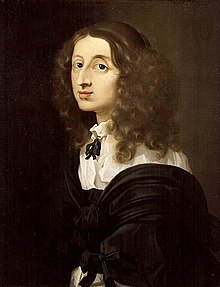 |
| Christina was described as being "short, pockmarked, with a humped right shoulder" |
Finally, free to do as she wished, Christina traveled Europe. She became a major patron of the arts, amassing a huge collection of Venetian school paintings, opening the first opera house in Rome, sponsoring the composers Arcangelo Corelli and Alessandro Scarlatti, founding the still functioning Arcadia Academy, and rescuing the reputation of the architect Bernini. She began writing herself, publishing three main philosophical works and sponsoring philosophical conventions around Europe.
Though Christina spent most of the rest of her life writing, art collecting, and philosophizing, she did make two more forays into politics. In 1657, it came to light that Christina had been plotting the takeover of Habsburg Naples with the support of the French crown. The scheme collapsed after Christina attended the summary execution of a traitorous servant at Fontainebleau. In 1667, she attempted to have herself elected queen of Poland but was unsuccessful. She was, reportedly, not too distressed about this failure.
In 1670, Christina returned permanently to Rome and lived there until her death in 1689. She died a well-respected philosopher and patron of the arts. She was buried in the Vatican Grotto--one of only three women to be buried there.
 |
| Christina in her later years |
One of the most commonly discussed aspects of Christina is her gender and sexuality. Historians have been quibbling over the question since before Christina was history, and unless Christina rises from the grave to give us a definitive answer, it is unlikely that we will ever have a definite answer. Christina has been, by turns, described as straight and slandered, bisexual, lesbian, transgender, hermaphrodite, and asexual.
This historian strongly favors the bisexual and lesbian theories, as Christina's name was later linked with that of Cardinal Decio Azzolino, as well as that of Ebba Sparre. Christina also wrote passionate letters to women whose writings she admired and once spent several hours alone with a famed courtesan. Whatever Christina may have felt and done with other people, it seems likely that Ebba was the love of Christina's life. Christina's lifelong letters to Ebba show a woman who is very much in love, and neither party ever found happiness with another person (Ebba's marriage was famously unhappy).
 |
| Christina's tomb beneath St. Peter's Basilica in Rome |
¹Christina reportedly learned to speak Latin, Spanish, Italian, German, and French, in addition to Swedish. She also had some knowledge of Hebrew and Arabic. Out of all of these, French was the one she used most frequently and the language she wrote in.
²Christina loved learning from Oxerstina and claimed to prefer learning from him above all else. However, later in her reign, she limited his power, resentful of his attempts to limit her power during her minority. Oxerstina, a devout Lutheran, tried to limit Christina's contact with her cousins due to the Calvinist leanings of their parents. This may also have contributed to Christina's later ambivalence toward him.
³Though she assumed the throne in 1644, she was not officially crowned until 1650 because of Sweden's involvement in constant warfare.
⁴Religious tolerance aside, colonists of New Sweden were still supposed to try and convert the Native Americans to Christianity.
⁵Descartes unfortunately died of pneumonia four months after reaching Stockholm. This may have been contributed by Christina's insistence at 5 am study sessions in the freezing winter.
⁶Quote taken from "'A Girton Girl on a Throne': Queen Christina and Versions of Lesbianism, 1906-1933" by Sarah Waters.
This article was edited by Mara Kellogg.
"Christina of Sweden" by Marguerite Horan Gowen
"Christina of Sweden (Continued)" by Marguerite Horan Gowen
"A Girton Girl on a Throne': Queen Christina and Versions of Lesbianism, 1906-1933" by Sarah Waters
"Two Portraits of a Queen: Calderón and the Enigmatic Christina of Sweden" by Deborah Compte
Wasa, Kristina (1626-1689)
Christina, Queen of Sweden
Famous Queen Christina
Queens Regnant: Christina of Sweden--the Girl King
Queen Coins: LGBTQ Rulers Through History


